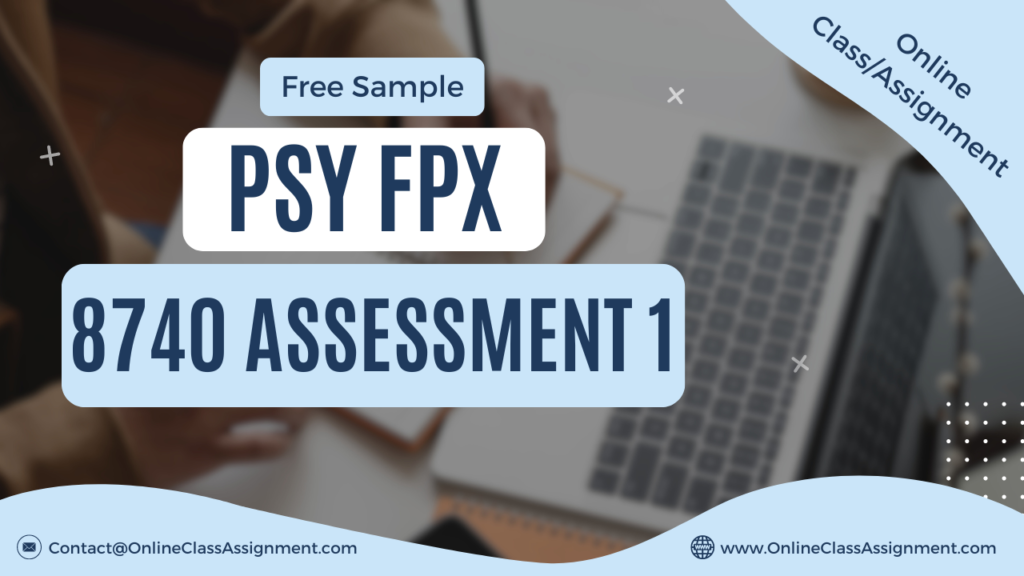
PSY FPX 8740 Assessment 1 Psychological Foundations
Student Name
Capella University
PSY FPX 8740 Industrial/Organizational Psychology Practices in Human Resource Management
Prof. Name
Date
Introduction
A manufacturing organization with aspirations for expansion seeks to transition from a small-scale operation to a medium-sized enterprise to bolster its eligibility for government contracts, which necessitate showcasing a diverse workforce. Consequently, considering the engagement of an Industrial-Organizational (I/O) Psychologist consultant becomes imperative. This discussion aims to delineate the advantages they offer compared to traditional Human Resource Management (HRM) practices.
Understanding I/O Psychologists and HRM Professionals
I/O Psychologist: An individual with specialized training utilizes insights into human behavior to effectively address organizational challenges (Industrial and Organizational Psychology: Science for a Smarter Workplace, 2021).
HRM Professional: Responsible for managing personnel within an organization by adhering to established policies and procedures (Paauwe, Jaap, & Farndale, 2018).
Challenges in Human Resources
Embracing workplace diversity not only enhances financial performance but also facilitates the transition to medium size, crucial for securing federal contracts. Thus, meticulous steps are essential in the hiring process:
- Learning, assessing, and discerning patterns.
- Identifying and collecting pertinent data.
- Analyzing and identifying key messages.
- Crafting summaries and prescriptions.
Human Resource Challenges Continued
Utility theory underscores the importance of weighing costs against consequences in decision-making processes. For instance, evaluating training strategies for new employees entails considering cost-effectiveness and success rates.
Differences between I/O Psychologists and HRM Professionals
I/O Psychologist
- Education: Bachelor’s degree in Psychology followed by advanced degrees such as Master’s or Doctorate.
- Licensing: Some states mandate licensure for specific I/O practices (Guidelines for Education and Training in Industrial/Organizational Psychology, 2017).
HRM Professional
- Education: Bachelor’s degree in various business-related fields, with potential requirement for a master’s degree.
- Certification: While licensure is not obligatory, certifications, such as those from SHRM, enhance employability (Human Resource Managers, 2021).
Distinguishing Skill Sets
I/O Psychologist
- Communication (verbal and written)
- Project management
- Critical thinking
- Problem solving
- Strategic thinking
- Interpersonal skills
- Ethical considerations
HRM Professional
- Communication (verbal and written)
- Interpersonal skills
- Decision making
- Conflict management
- Organization
- Negotiation
Competencies
I/O Psychologist
- Test development and psychometrics
- Statistical methods
- Research methods
- Organizational development
- Coaching and mentoring
HRM Professional
- Recruitment and selection
- Talent management
- Change management
- Succession planning
- Government and regulatory compliance
Professional Associations
I/O Psychologist: Society for Industrial and Organizational Psychology (SIOP) offers resources to keep practitioners updated on advancements (Industrial and Organizational Psychology, 2016).
HRM Professional: Society for Human Resource Management (SHRM) provides resources, certifications, and networking opportunities (Human Resource Managers, 2021).
Benefits of Engaging an I/O Psychologist
Consultation services encompass analysis of various organizational aspects, including diversity training aligned with government standards and instrument utilization to enhance workforce effectiveness.
Organizational Assessment
Utilizing social-organizational theories, data gathering, and program design to optimize human resource planning and ensure organizational compliance.
Conclusion
Engaging an I/O Psychologist can significantly contribute to organizational growth, effectiveness, and compliance with regulatory standards.
References
Licensure information for I/O Psychologists: Membership. (2021). Retrieved from Society for Industrial and Organizational Psychology: https://www.siop.org/Membership/Licensure-Policy-by-
PSY FPX 8740 Assessment 1 Psychological Foundations
Paauwe, Jaap, & Farndale. (2018). Strategy, HRM, and Performance: A Contextual Approach. Oxford University Press. Retrieved from ProQuest Ebook Central: https://ebookcentral-proquest-com.library.capella.edu/lib/capella/detail.action?docID=5143475
Pursuing a Career in I/O Psychology. (2013). Retrieved from American Psychological Association: https://www.apa.org/education-career/guide/subfields/organizational/education-training
Society for Human Resource Management (SHRM). (2021). Retrieved from Membership: https://www.shrm.org/about-shrm/Pages/Membership.aspx
PSY FPX 8740 Assessment 1 Psychological Foundations
What is SIOP? (2021). Retrieved from Society for Industrial and Organizational Psychology: https://www.siop.org/Portals/84/SIOP%20Docs/Membership%20Docs/member_brochure.pdf
Get Capella University Free MS Psychology Samples
PSY FPX 5002
PSY FPX 6710
PSY FPX 5110
PSY FPX 6720
PSY FPX 6730
PSY FPX 6740
PSY FPX 7610
PSY FPX 6O15
